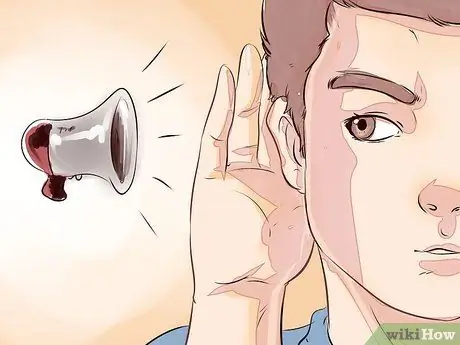- Author Jason Gerald gerald@how-what-advice.com.
- Public 2023-12-16 10:50.
- Last modified 2025-01-23 12:04.
A successful speech is one that is evocative, contains well-crafted and accurate content, and is delivered with charisma and grace. To critique a speech, you need to assess the speaker's ability to write and deliver the text. Find out if the speaker uses facts and anecdotes to make the point in his speech convincing, and find out if his style of delivery can inspire listeners to stick with his speech to the end. Delivering your criticisms and suggestions to the speaker will help the speaker to improve himself and become a better speaker in the future.
Step
Method 1 of 3: Evaluating the Content

Step 1. See if the content of the speech fits the audience
The content of a speech, including word choice, references, and anecdotes, should be made to suit the audience listening to the speech. For example, an anti-drug speech aimed at elementary school children will certainly be different in content when compared to a speech with the same theme but for teenagers. When you listen to his speech, try to see if the content of his speech is right on target or not.
- Don't make criticism based on personal opinion. Make a critique based on how the listeners would respond to their speech. You shouldn't let your bias get into the judgment.
- If possible, watch the reactions of the participants who listened to the speech. Do they seem to understand? Are they paying close attention? Do they laugh at the jokes that are told? Or do they look bored?

Step 2. Evaluate the clarity of the speech
The speaker of the speech must use proper grammar and easy-to-understand language so that his speech is pleasant to hear and can be followed and understood. The speaker must be able to convey the subject or topic of his speech in a few sentences, and be able to convey the contents of his speech fluently and understandably. Again, whether or not you agree with the points conveyed by the speaker does not have to be used as an assessment material. When you want to determine if the speech is clear, consider the following questions:
- Is the opening effective? Does the speaker have to make his main argument clear in the first few sentences, or does he need to go into lengthy detail so you finally know what he's really talking about.
- Is the speech full of small points that don't relate to the main argument, or is the speech developed logically until it reaches a conclusion?
- If you want to re-explain the speech to others later, can you repeat all the main points or are you having a hard time explaining them?

Step 3. See if the speech is convincing or educational
In a well-prepared speech, the arguments must be made to support the main argument. The content of the speech should demonstrate the speaker's expertise in the topic he is presenting and make the listeners feel they are learning something new. Look for gaps or holes in the speaker's argument or points where his argument would be more convincing if he did more research.
- Listen to the name, date, and data presented to support the point or argument the speaker is making. Write down the speaker's name, date, statistics, and some other research information so you can check back later. After his speech is over, validate everything and make sure that all the information he conveys is accurate. Inaccurate information is something that needs to be told because it will have an impact on the credibility of the speech he delivers.
- If you have to criticize a speech right after it's finished, use the internet for quick validation of the information. You can use a question and answer session, a break, or another session to do this.

Step 4. Observe if the speech has any characteristics
Occasional anecdotes and jokes can lighten an overly serious situation and make the speech less boring. If the speech is too bland, even though the argument is convincing, the listeners will be lazy to listen to it, because they may feel bored and unfocused. As you're observing whether a speech is evocative and engaging, evaluate some of these questions:
- Does the speech begin with a catchy hook or opening line? In order to immediately attract the attention of participants, a speech usually begins with a sentence that can attract attention, be it funny or interesting.
- Was the speech interesting from start to finish? A good speaker will include a few anecdotes and jokes in his speech to keep the audience interested.
- Do the anecdotes or jokes come out distracting, or do they help build the speaker's argument? Some participants who listen tend to miss important points and only listen to interesting parts. The best way to properly and thoroughly criticize a speech is to wait for the speaker to crack a joke and listen to what he has to say after that. Ideally, a joke or anecdote he makes can highlight the main idea or argument he brings.
- Did the speaker use illustrations wisely? A good and memorable illustration is much better than three illustrations that the audience can't remember and don't really relate to the main purpose or argument of the speech.

Step 5. Evaluate the cover
A good ending should connect with all the points made and give participants new ideas and ideas thanks to the information presented. A bad ending simply summarizes the points that have already been made, or even states a new point that has nothing to do with everything that has been said throughout the speech.
- Remember, the closing of the speech is one of the most important parts of a speech. A cover must be able to grab the attention of the participants and be strong, thoughtful, deep, and concise.
- When closing a speech, the speaker must also show high confidence, as this will increase the participants' confidence in the speaker.
Method 2 of 3: Assessing the Delivery

Step 1. Listen to the speaker's tone of voice
Does the speaker speak in a tone that makes you want to continue listening, or does the tone sound out of place? A good speaker knows when to pause, and knows the speed and volume of voice to be heard. Of course, there is no theory of perfect delivery, because everyone has their own style of delivery. However, all great speakers have the ability to keep the audience engaged. Here are some things you need to pay attention to:
- Someone who speaks too loudly will appear aggressive, while someone who speaks too slowly will be difficult to hear. See if the speaker you are observing knows how loud he is talking at that moment.
- Many speakers tend to talk too fast without realizing it. See if the speaker you are observing is speaking at a natural, easy-to-understand pace.

Step 2. Pay attention to the speaker's body language
The way a speaker appears must show that he is confident and charismatic, so that it can make the audience who listens interested and excited. Some people who are not very good at public speaking may look down, don't or often forget to make eye contact, and other unimportant gestures, while a good speaker will do the following:
- Make eye contact with participants who are at several points. This will make all participants feel included in the speech.
- Stand up straight without looking nervous.
- Use natural hand gestures.
- At the right time, walk around the stage and not just fixate on the podium or one point.

Step 3. Listen to the filler words he uses
Too many “hmm”, “ee”, and so on will reduce the credibility of the speaker, because all these words will make him or her seem not very prepared. Listen to the words and note how often he uses them. Although they usually come out naturally, they should not degrade the quality of speech or be noticed by anyone.

Step 4. Observe if he remembers the content or script of his own speech
A good speaker already understands and remembers the content of the speech he will deliver long ago. It's common to use typed script or use PowerPoint to help remember, but looking at the script too much can distract the listeners.
Remembering the content of the speech allows the speaker to focus more on the delivery and how to attract the audience's attention through eye contact and body language, and prevents the speech from appearing like reading a book or rereading a script

Step 5. See if the speaker can handle the nervousness
Most people will experience stage fright when it comes to performing in public. Public speaking, in any form, is North America's second-biggest fear, and more feared than death. Great speakers may feel as nervous as most speakers. But they have learned and know how to hide it. Notice if the speaker you're watching seems nervous so you can offer some suggestions for how he can improve himself.
- Watch for gestures or gestures that are repeated unnecessarily and distract from the content of the speech. It could be a sign that he is nervous.
- A quivering voice or a tendency to mumble are also signs of nervousness.
Method 3 of 3: Delivering Constructive Criticism and Suggestions

Step 1. Take detailed notes throughout the speech
Bring notes and pens when you are going to observe someone's speech, so you can note down what needs improvement. Writing snippets of words or things from the speaker will allow you to convey your criticisms and suggestions more clearly and neatly. Taking detailed notes will also help the speaker understand how to improve later.
- If you have time and are not prohibited, record the speech using a recording device, whether it's just sound or video. That way, you'll be able to replay the speech a few times and really identify and convey things you can clearly suggest.
- In your notes, separate suggestions related to delivery and content or content. Include examples to support your suggestions and criticisms.

Step 2. Discuss your assessment of the content or content of the speech with the speaker
Rewrite the speech by section, from the opening to the closing. Provide evaluations and ratings. Do you think the main points of his speech were well conveyed and supported? Did you find the whole speech convincing and credible? Can you consider the speech you just saw as a success, or does it still need improvement?
- Tell the speaker which parts you found interesting in his speech, which parts were confusing, and which parts needed more references and data.
- If certain anecdotes or jokes don't work, tell the speaker. It's better to be honest right then and there than to see him make the same mistake twice.
- Say whether you think the speech was on point or not.

Step 3. Give criticism and suggestions regarding the delivery
Usually the speaker needs the most criticism and suggestions in this section, as evaluating style and body language is difficult on your own. Give honest but well-delivered critiques and suggestions on how to deliver your speech, starting from body language, volume and tone of voice, speed, eye contact, and body posture.
- You may want to discuss the concept of emotional intelligence or EQ, which is also a part of a person's ability to read participants' reactions and keep them interested by influencing their emotions. The goal of making eye contact, speaking clearly, and sounding natural is to make participants feel that you care about them and that you want them to understand what you have to say. Helping them feel involved in your speech will keep them listening well.
- If the speaker seems nervous, you may want to suggest techniques that might help him overcome stage fright, such as practicing more, relaxing before going on stage, or practicing in front of a smaller number of people.

Step 4. Also mention the positive things you find
The speaker you are criticizing must have done a lot of writing and rehearsing. At the same time you're criticizing, you also need to say good things or he's done right. If you're criticizing a student or someone who needs help improving their public speaking skills, appreciating their efforts will help boost their confidence and desire to keep improving.
- Try taking turns: complimenting and appreciating some things he did in his speech, then pointing out what needs to be improved, then complimenting other points. This classic method will make your criticism more acceptable. For example, you could say that the opening sentence he uses is good, but you are a little confused by his second point, but his conclusion makes it clearer.
- As a way to support and reward someone for continuing to learn, you may want to encourage the speaker you are criticizing to see videos of famous speakers. Point out the similarities and differences between the speech and speaker you are criticizing and what is in the video.
Tips
- Use an evaluation form, grade scale, or point system in your classroom to create a little bit of competition. This will help you score a student's speech and determine who made the best speech.
- Give suggestions for improvement. When in class or in competitions, it is important to help the speaker know that he can improve and improve his abilities. Be specific and positive. Give constructive criticism as well as praise.






